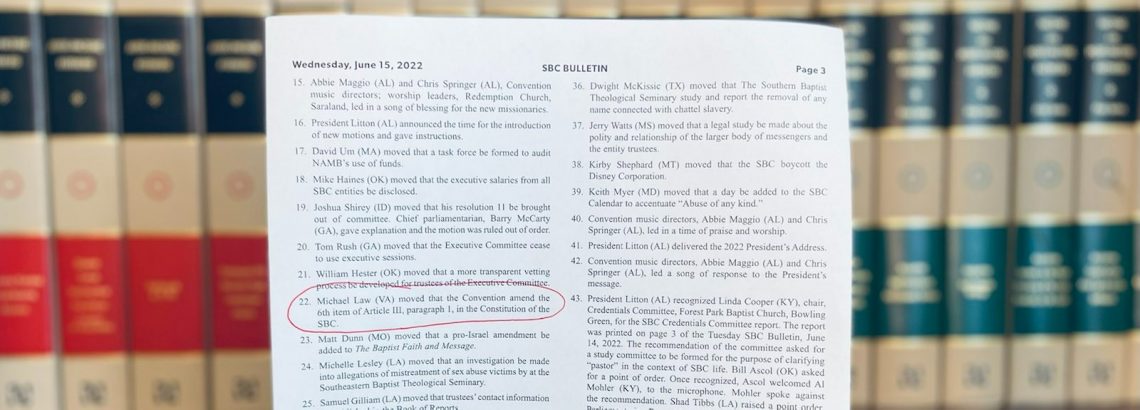As many of you know, the Southern Baptist Convention has been having an intramural debate over women serving as pastors. This has been sort of a surprise to many people because our doctrinal statement, the Baptist Faith & Message, is so clear on the matter: “While both men and women are gifted for service in the church, the office of pastor is limited to men as qualified by Scripture.” Clear enough, right? How could there be any controversy?
Well, we have a number of churches who are now saying that women can indeed serve as pastors. There are multiple justifications given for this. For Saddleback Church—which has ordained women associate pastors and has now called a female preaching pastor—their pastor claimed on the floor of the Southern Baptist Convention that the gift of pastoring is not the same thing as the office of pastor. Therefore, women can be pastors. For others, they have argued that the BF&M’s language restricting the pastorate to qualified men is really only about senior pastors but not about associate pastors. On this reasoning, women can serve as associate pastors but not as senior pastors.
No matter the justification, the result is the same. Some SBC churches are calling women to serve as pastors, and they are doing so by claiming that the BF&M’s prohibition on female pastors doesn’t apply to them. And therein is the controversy.
As a result of this controversy, Pastor Mike Law made a motion at the 2022 meeting in Anaheim to amend the SBC Constitution to clarify the matter. His motion would add a single sentence to Article 3 of the SBC Constitution. I’m going to print Article 3 as it currently stands below with the proposed amendment highlighted in red:
Article III. Composition… The Convention will only deem a church to be in friendly cooperation with the Convention, and sympathetic with its purposes and work (i.e., a “cooperating” church as that term is used in the Convention’s governing documents) which:
- Has a faith and practice which closely identifies with the Convention’s adopted statement of faith. (By way of example, churches which act to affirm, approve, or endorse homosexual behavior would be deemed not to be in cooperation with the Convention.)
- Has formally approved its intention to cooperate with the Southern Baptist Convention. (By way of example, the regular filing of the annual report requested by the Convention would be one indication of such cooperation.)
- Has made undesignated, financial contribution(s) through the Cooperative Program, and/or through the Convention’s Executive Committee for Convention causes, and/or to any Convention entity during the fiscal year preceding.
- Does not act in a manner inconsistent with the Convention’s beliefs regarding sexual abuse.
- Does not act to affirm, approve, or endorse discriminatory behavior on the basis of ethnicity.
- Does not affirm, appoint, or employ a woman as a pastor of any kind.
This motion to amend the Constitution has been referred to the Executive Committee, and we await a decision from them whether they will take it up and recommend it to the Convention.
I want to weigh-in on this amendment, but as I do so I should stipulate that I am just speaking for myself and how I would vote as a messenger from my church. The wisdom of this amendment is a prudential matter, and I am not putting forth my view as the single way of righteousness. Nor am I necessarily representing the views of any of the organizations I work for. Indeed, some of my colleagues may have a different assessment, and I don’t wish to foreclose healthy, brotherly deliberation about the best path forward.
Having said that, if it came to the floor as it is currently written, I would vote to approve this amendment. I believe it would remove all doubt as to where the SBC stands on the matter and would remind churches what the BF&M already requires of those who wish to closely identify with the Convention’s adopted statement of faith. It would also give clear guidance to the Credentials Committee as they deliberate about Saddleback Church’s ordination of female pastors.
With that in view, I want to offer a caveat about my endorsement of the amendment and then also answer some objections to it.
A Caveat
I do not wish my endorsement to imply that the BF&M and SBC Constitution are currently unclear on the matter of female pastors. I believe that the BF&M is already sufficiently clear that the pastoral office is reserved for men as qualified by scripture, and that would apply to any pastor (senior, associate, or otherwise). SBC President Bart Barber has argued convincingly from history and from the text of the BF&M that this is the case, and I highly recommend that you read what he wrote. Moreover, as I have argued elsewhere at length, the SBC Constitution already gives the Credentials Committee guidance about how to apply this standard. The Constitution does not require churches to subscribe to the BF&M to be in friendly cooperation, but it does require churches not to contradict the BF&M.
All of that is already clear in the SBC’s governing documents if folks are reading them carefully. Voting for the amendment would not imply that I think the matter is unclear. I would only be voting for it as a concession to brothers and sisters who would don’t think it’s clear and who would like to see more clarity on the matter. For my part, there is no harm in adding clarity to clarity, so I would raise my ballot in favor of this amendment.
Answering Potential Objections
1. I have heard some object to the language “of any kind” in the amendment. They are concerned that this would preclude women from serving in ministry in any way that overlaps with the activities of a pastor. I think this objection is based on a strained reading of the amendment. The BF&M clearly states that “both men and women are gifted for service in the church,” and there is nothing in this amendment contradicting that language. Also, there is no shortage of ministries for women to fulfill in the church, and the Holy Spirit certainly gifts them for such ministries. The wording of the amendment doesn’t preclude women from ministry. It simply stipulates that they mustn’t do so as a pastor, and “of any kind” specifies that this applies to all pastoral roles (senior, associate, or otherwise).
2. Some may question whether this is the best wording to include in such an amendment: “Couldn’t we do better than this?” To that, I would simply answer that there is more than one way to achieve the same goal. I’m sure there are multiple ways we could word things to ensure fidelity to the Bible’s teaching. If I had written the amendment, I probably would not have worded it as a prohibition but as an affirmation of the language in the BF&M. Perhaps something along these lines: “Only affirms, appoints, or employs pastors/elders/overseers who are men as qualified by scripture.” But at the end of the day, that objection feels more like a quibble than a substantive problem because either approach achieves the goal. So I’m happy to support Mike Law’s proposal.
3. I have heard some folks express concern that an amendment like this will be divisive and may alienate SBC churches who employ female associate pastors. This is an important objection, and I have four answers to it.
First, in the long run it will be more divisive to base our cooperation on an error than to base our cooperation on the truth. Jesus’ sheep hear his voice and rally to it (John 10:27). Nothing unites God’s people more happily than the truth. Nothing divides us more grievously than error. We know what the Bible says about this (1 Timothy 2:12; 3:2), and we ought to agree together to move forward in keeping with the Bible’s teaching.
Second, I suspect that many churches that have female associate pastors may be doing so not because they are trending liberal but simply because of concept creep around the term “pastor.” These women may be functioning in ministries that are entirely within biblical parameters, but they simply have a pastoral title. I’ve written about “concept creep” elsewhere and won’t belabor the point here. For such churches, the solution is a relatively easy fix and doesn’t require them to leave the SBC. They can simply align their staff titles to comport with scripture.
Third, I think this objection misses how our Credentials Committee actually works. Our credentials committee is not set up to be an active inquisitor but a passive one. They don’t seek out churches to exclude from the Convention. The Committee only responds to referrals that are brought to them. So I wouldn’t want or expect a forward-leaning, wide-ranging inquisition from the Credentials Committee on this. That is not how our bylaws set them up to work.
Fourth, if a church gets referred to the Credentials Committee for denying this or any other part of the BF&M, the Credentials Committee should allow the church every opportunity to rectify the situation. Even with this proposed amendment, the SBC Constitution and Bylaws allow for churches to rectify the situation. If the church does not wish to rectify their departure from the BF&M, then I believe the Committee has a Constitutional duty to act accordingly. Excluding a church should not be anyone’s first choice. Let’s hope all things, believe all things, and maintain an eagerness that a given church would come back around to friendly cooperation. Let’s work toward that kind of solution first. But let’s also not forget that some churches may actually reject what the BF&M says about the office of pastor. If they do and won’t relent in that rejection, then the SBC and that church would be better off parting ways.
Conclusion
Whether this amendment proposal ever makes it to the floor of the SBC for a vote remains to be seen. If it does, I would raise my ballot in favor of it. I suspect that many other messengers would raise their ballots as well. At the Convention in Anaheim, there seemed to be a great deal of unity in the room when Albert Mohler rose to speak about the definition of the term “pastor” in the BF&M. That unity was one of the more encouraging moments of the annual meeting. Perhaps an amendment like this could give concrete expression to that unity. We shall see.






